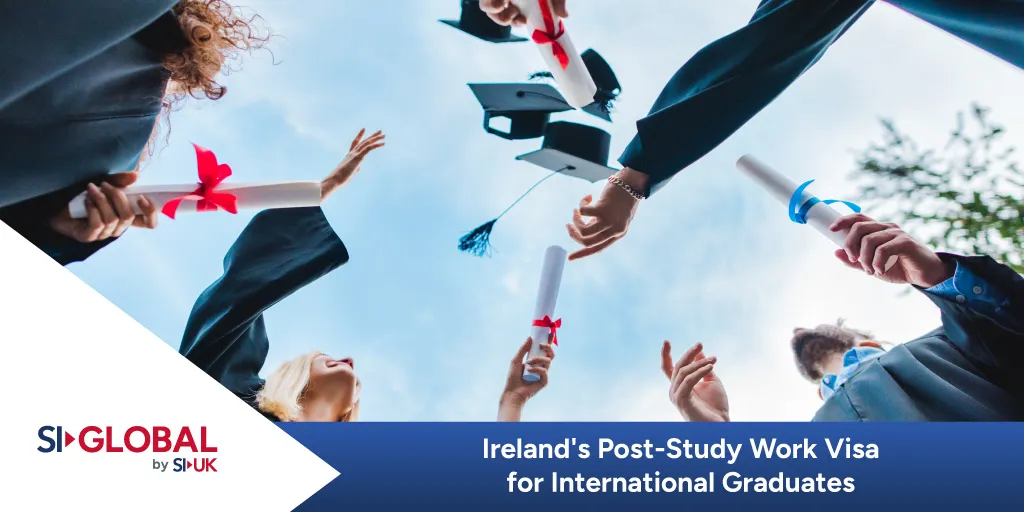A strategic report on the ‘First Destination of Graduates’ from the Higher Education Authority (HEA) of Ireland highlights that approximately 70% of all graduates from the seven public universities in Ireland are employed shortly after graduation. Among these employed graduates, around 60% found work within Ireland, while about 10% secured positions abroad. This indicates a robust domestic job market and international mobility for Irish graduates.
Ireland’s job market is particularly attractive for graduates due to steady growth in the service sector, making it the preferred destination for Irish university alumni. Employment trends reveal that graduates are predominantly absorbed in Information and Communication Technology (ICT) companies, followed by positions in the education sector. Other popular industries for Irish graduates include healthcare, business services, and finance.
Top Destinations for Employed Irish Graduates
- United Kingdom
- United States of America
- Germany
- France
- China
These destinations reflect the global opportunities available to Irish graduates, especially in countries with strong ties to Ireland in terms of economic and educational partnerships.

Study and Work in Ireland: Academic Trends and Graduate Profiles
The HEA report outlines significant growth in the number of graduates from Irish universities. In 2021, a total of 88,638 students graduated, marking an 8.8% increase from the previous year. Of these, 41.3% completed an Honours Degree, while 19.7% pursued Taught Master’s degrees. This increase in graduates aligns with Ireland's ongoing efforts to enhance its education system and produce a highly skilled workforce.
In terms of subjects, Business, Administration, & Law were the most popular areas of study, with 20.6% of students choosing these disciplines in 2020/21. Health & Welfare also attracted a significant number of students, accounting for 17.5% of enrolments. This subject preference highlights the demand for business and healthcare professionals in Ireland's economy.
Graduate Performance Trends: A significant proportion of students graduated with a First-Class Honours degree, reflecting the rising academic standards at Irish universities. In 2021, 23.5% of graduates achieved this distinction, compared to 20.9% in 2020 and just 5.9% in 2015. This upward trend underscores the dedication of students and the commitment of Irish universities to fostering academic excellence.
Better Work Opportunities in Ireland for Graduates
Ireland’s rapidly growing economy provides excellent work opportunities for university graduates, positioning it as an appealing post-study destination. Key reasons why Irish graduates have better job prospects compared to those in other European countries include:
-
Strong Economic Growth: Ireland is one of Europe’s fastest-growing economies, with particular strengths in tech, finance, and pharmaceuticals. This economic climate creates numerous job opportunities for new graduates.
-
Industry Collaboration: Irish universities collaborate closely with industry partners, ensuring graduates are work-ready and possess relevant skills for in-demand sectors.
-
Presence of Multinational Corporations: Many multinational companies have their headquarters or significant operations in Ireland. This not only opens up job opportunities but also provides students with internships and placements that enhance their employability.
-
International Connectivity and Safety: Ireland is considered a safe and welcoming country for international students, with a vibrant global workforce and a well-connected location that offers easy access to major European cities.
-
Post-Study Work Visa: International students completing undergraduate or postgraduate degrees are eligible for a two-year stay-back visa. This visa allows graduates to gain valuable work experience and establish their careers in Ireland.
Overall, Ireland’s friendly environment, high quality of life, and excellent work opportunities make it a popular choice for international students.
How to Study in Ireland and Obtain a Student Visa with Work Permit
International students in Ireland benefit from a straightforward visa process that includes the option for work permits during and after their studies.
-
Eligibility Criteria for Work Permits: Students must be enrolled in accredited and recognised degree programmes, which are listed on the Interim List of Eligible Programmes (ILEP). This ensures that their qualifications align with the requirements for work permits.
-
Work While Studying: Students can take up casual employment during their studies, subject to specific time limits. This allows them to gain work experience and manage living expenses.
-
Post-Study Work Visa: After completing their degree, students can apply to extend their visa for up to two years. This extension facilitates a smooth transition into full-time employment and enables graduates to establish themselves in the Irish job market.
Ireland's Post-Study Work Visa: Benefits and Requirements
Ireland offers a generous Post-Study Work Visa, formally known as the Third Level Graduate Programme, which allows international students to remain in Ireland and work after completing their studies. This programme is a significant draw for students seeking practical work experience and career growth following their education. Here’s an overview of the benefits, eligibility requirements, and application process for the Post-Study Work Visa in Ireland:
Benefits of the Post-Study Work Visa
-
Extended Stay for Career Development: Undergraduate and postgraduate students can stay in Ireland for up to two years after graduation, providing ample time to gain valuable work experience and establish a professional network.
-
Access to the Irish Job Market: The visa enables graduates to work full-time, granting them access to various job sectors, including technology, finance, healthcare, and education. The visa’s flexibility also allows graduates to explore job opportunities across different industries.
-
Pathway to a Long-Term Work Permit: Experience gained during the post-study period can be a stepping stone toward securing a long-term work permit or residency in Ireland. Graduates often use this time to qualify for employment permits, such as the Critical Skills Employment Permit, which facilitates the path to permanent residency.
-
Opportunity to Build a Professional Network: By working in Ireland, graduates can develop relationships with industry professionals and employers, which can be advantageous for career advancement, both within Ireland and internationally.
Eligibility Requirements for the Post-Study Work Visa
To qualify for Ireland's Post-Study Work Visa, students must meet the following criteria:
-
Graduate from a Recognised Irish Institution: Students must have completed an accredited degree programme at a recognised Irish institution. The degree must be at least a Level 7 qualification on the National Framework of Qualifications (NFQ).
-
Proof of Degree Completion: Graduates need to provide evidence of degree completion, such as an official transcript or diploma. This documentation is necessary to demonstrate that they have successfully fulfilled their academic requirements.
-
Application within the Stipulated Time Frame: Graduates must apply for the visa within six months of receiving their final results. Applying promptly is essential to avoid missing out on this valuable opportunity.
-
Financial Stability: Applicants must show they can support themselves financially during their stay. This includes providing bank statements or evidence of funds to cover living expenses.
-
Valid Permission to Remain: The student must have a valid immigration permission (Stamp 2) at the time of application and continue to meet all the requirements for lawful residence.
Application Process for the Post-Study Work Visa
The application process for the Post-Study Work Visa is straightforward:
-
Gather Necessary Documentation: Students need to prepare their passport, proof of degree completion, financial statements, and any other documents required by the Irish Naturalisation and Immigration Service (INIS).
-
Submit the Application Online: Graduates can apply for the visa online via the INIS website. After submitting the application, they will need to attend a local immigration office to finalise the process and receive their new immigration stamp.
-
Receive Stamp 1G: Upon approval, graduates are granted Stamp 1G, which permits them to work full-time in Ireland for up to 24 months. This stamp also allows the holder to stay in Ireland legally while exploring permanent work opportunities.
Work Opportunities and Long-Term Residency
Ireland’s Post-Study Work Visa opens doors to various employment opportunities, and with a thriving economy and numerous multinational companies, graduates are well-placed to build rewarding careers. After the post-study period, graduates can transition to long-term work permits, such as the General Employment Permit or the Critical Skills Employment Permit, which are tailored to Ireland’s skills needs and offer pathways to long-term residency.
By taking advantage of the Post-Study Work Visa, international graduates can maximise their academic experience and leverage Ireland’s dynamic job market to further their careers. Whether graduates plan to stay in Ireland or pursue international roles, this visa is a valuable asset in launching a successful professional journey.
Study in Ireland
Ireland’s thriving job market, supportive academic environment, and comprehensive visa options make it an ideal destination for international students. With strong industry links, a welcoming culture, and a wealth of opportunities, Ireland provides graduates with the skills, experience, and support they need to embark on successful careers.
To learn more about studying in Ireland or to begin your application, arrange a free consultation today.








